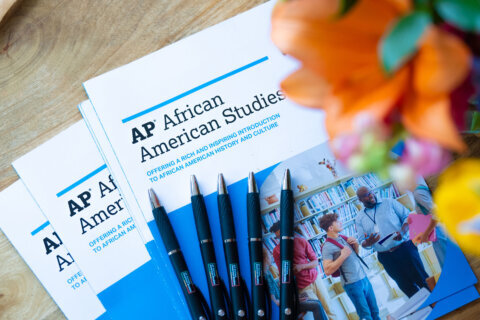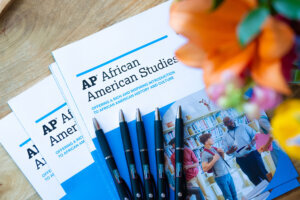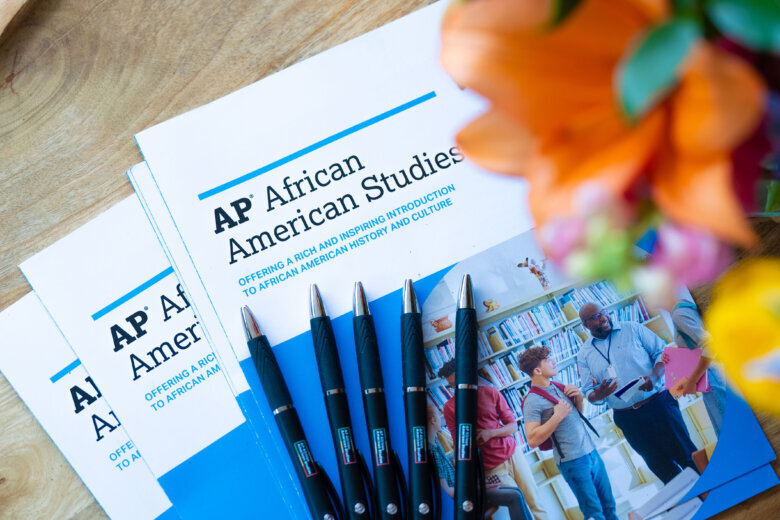
After more than six months of review by the state’s education department, Virginia students will now be able to take the College Board’s Advanced Placement course covering African American studies.
The Virginia Department of Education determined that the class did not conflict with Governor Glenn Youngkin’s controversial first executive order.
In a statement to WTOP, the department said that the course will be offered in some Virginia schools this year, during the final year of the College Board’s pilot.
“The Secretary of Education’s office completed its review of the AP African American Studies course and found it does not violate Executive Order One,” a spokesperson told WTOP.
Officials with the College Board released the framework for its long-planned African American Studies course at the start of Black History Month. The course material, created in consultation with over 300 African American Studies professors across the country, is broken into units covering the origins of the African diaspora, scholarship on freedom, enslavement and resistance, the practice of freedom, and movements and debates.
“This course is an unflinching encounter with the facts and evidence of African American history and culture,” CEO of the College Board David Coleman said in a statement on the course framework. “No one is excluded from this course: the Black artists and inventors whose achievements have come to light; the Black women and men, including gay Americans, who played pivotal roles in the civil rights movement; and people of faith from all backgrounds who contributed to the antislavery and civil rights causes.”
Robert J. Patterson, a Professor of African American Studies at Georgetown University and co-chair of the committee developing the program, said the class would do much more than what even his introductory African American Studies courses could in a semester.
“Since its inception, the development of the AP African American Studies course has been an ongoing, iterative process that calls upon the expertise of teachers, professors, and experts who understand the key concepts, themes, and methodologies of African American Studies and this refining process, which is a part of all AP courses, has operated independently from political pressure,” Patterson said.
Conservative opposition to critical race theory — a way to think about America’s history through the lens of racism — was among the major issues that slowed the implementation of pilot courses and led to a national controversy in Florida.
That challenge made its way to Virginia, arguably culminating in the creation of Governor Glenn Youngkin’s first executive order — a contentious order that several local groups said focused on Critical Race Theory as a means of indoctrination rather than teaching the entirety of Virginia’s history.

“No existing Standard of Learning is intended to teach children that one race is superior or inferior to another. Recognizing difficult moments in our nation’s past is not, in itself, divisive,” the Virginia Parent Teacher Association and seven other educational groups wrote in a joint statement last year.
This year, a month after Florida rejected the College Board’s move to include an Advanced Placement course covering African American Studies, Virginia began reviewing the course under the governor’s first executive order.
“After numerous reports about draft course content, the governor asked the Education Secretariat to review the College Board’s proposed AP African American Studies course as it pertains to Executive Order 1,” Virginia Gov. Glenn Youngkin’s spokeswoman, Macaulay Porter, said in February.
The decision prompted a quick condemnation from organizations across the region, including the state’s NAACP chapter, which said the decision to target the course contradicted the Governor’s goal to teach a full and accurate history to Virginia students.
“There should be no question as to whether African American Studies is a worthy topic of study from an administration that stated a desire to teach all of American history,” the chapter said.
By April, the board announced that a pilot was ongoing in 800 schools across the nation — potentially including 10 schools in nearby Montgomery County, Maryland, that were offered participation in the pilot.
While under review in Virginia, the committee of scholars building the class announced plans to roll out changes that would promote access for as many students as possible while ensuring that enrolled students get a holistic introduction to the field.
“We are committed to providing an unflinching encounter with the facts and evidence of African American history and culture. To achieve that commitment, we must listen to the diversity of voices within the field. The development committee and experts within AP remain engaged in building a course and exam that best reflect this dynamic discipline,” the College Board said.
The current course development timeline expects pilots to continue through the spring of 2024, when the College Board will offer the first set of AP African American Studies Exams to students. By the following school year, all schools will be able to offer AP African American Studies to students, which the organization said could boost enrollment in similar degree programs.
“We expect AP African American Studies to have a significant positive impact on college course enrollments within the field,” the board said. “Research consistently shows that students who take AP courses are more likely to take additional related coursework in college and to major or minor in that discipline.”
WTOP’s Abigail Constantino, Scott Gelman, Dick Uliano and Ciara Wells contributed to this report.









